theartsdesk at Latitude: Damon Albarn/Booker T Jones | reviews, news & interviews
theartsdesk at Latitude: Damon Albarn/Booker T Jones
theartsdesk at Latitude: Damon Albarn/Booker T Jones
Booker T Jones' set of Sixties hits wows the crowd - but is Damon Albarn's new solo material a touch too subtle to headline?
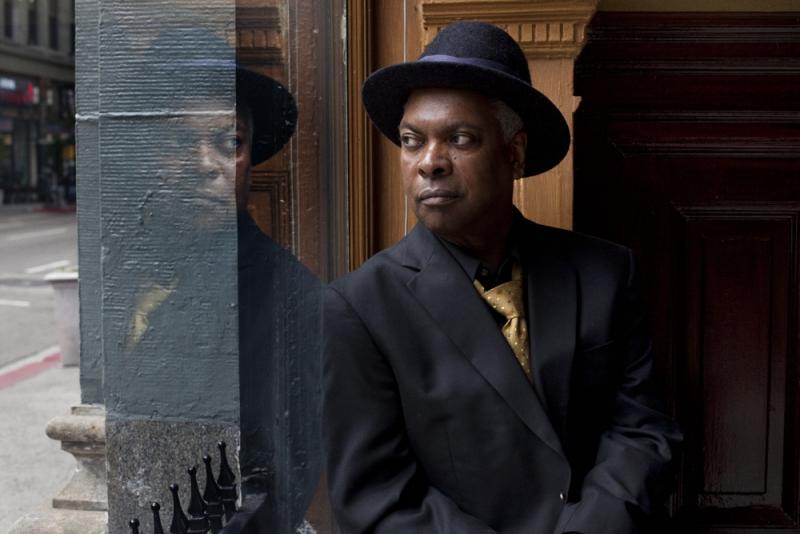
Booker T Jones seduced, his delivery a river of molasses, his beaming smile so suave it was difficult to believe he was, actually, singing the blues. Damon Albarn coaxed, like a well-meaning dad who’s taken his kids on a rainy picnic (a thunderstorm engulfed the end of his set) and wants them, in spite of everything, to have a good time. Lily Allen flounced and stropped; Kelis shook her booty, looking, in a gleaming golden dress, like a queen bee instructing the drones.
There are many ways of wooing the crowd at the Latitude main stage, and last weekend saw most of them. It’s tough, though: the Obelisk Arena is a prairie of a stadium, perched on top of a hill, the opposite of a natural theatre, and with easily the most powerful sound system at the festival, sound spills down the hillside and is broadcast to the campsites on the opposite side of the valley. The acts on smaller stages talked to and embraced their audiences, but it’s a big ask to conduct a tender dialogue through a 100,000-watt PA system. You need to have total confidence in your performance to make it work.
The question of Albarn’s voice was inevitably raised by such prolonged exposure
Booker T Jones gave perhaps the most straightforwardly satisfying performance of the festival, playing a medley of hits the audience both knew and loved, including “Green Onions” and “Soul Limbo”. There was a concession to a contemporary sound (in a programme taken substantially from his days with the M.G.'s) with a few lines of rap during “Take Me to the River”, but for the most part this was a reminder of why the M.G.’s are still one of the most important and influential bands of the 1960s, and not just in Memphis soul.
The contrasting textures of the sweet, whistling organ and gritty electric guitar create a deliciously bittersweet sound, while a similar contrast, between the abject sorrow literally conveyed by the lyrics and the sheer physical vigour expressed by the music creates an intensely vivid, if somewhat improbable, human drama. The extravagant artifice of this music is another of its many charms. His voice was in good form, too, with an extraordinary range and tremulous, emotion-drenched tone. Booker T didn’t challenge anyone. His repertoire was decidedly safe. But on a warm summer’s afternoon, soon after lunch, he got thousands of people to dance, and feel cathartically good by sharing someone else’s sorrow.
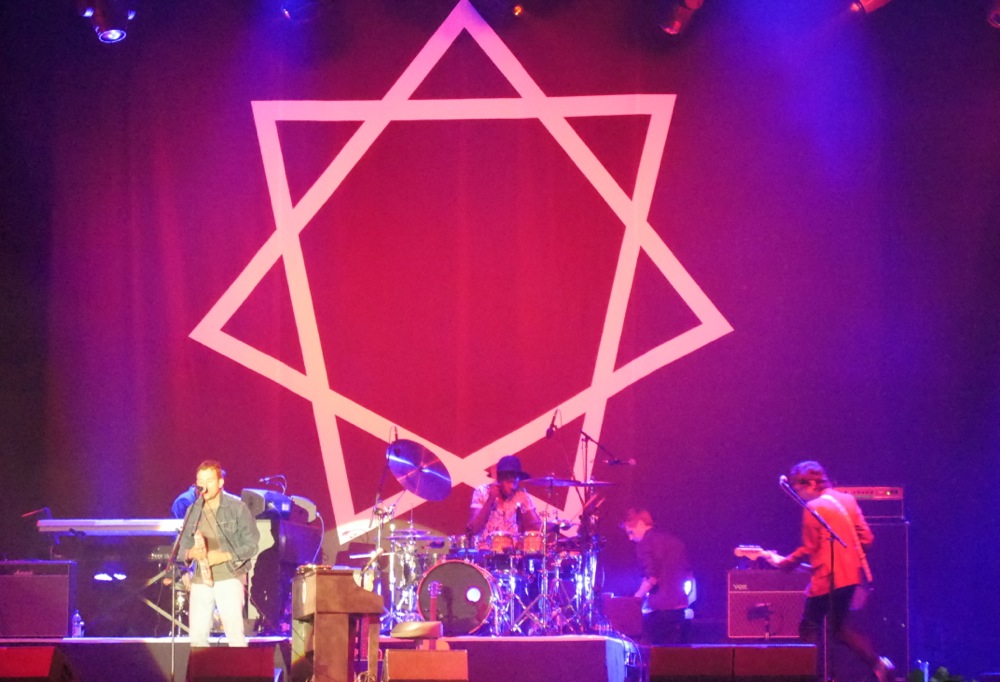 Damon Albarn (pictured left) took, perhaps, the opposite approach, deciding to test the audience’s mettle with his new album, Everyday Robots. It was well received on release earlier this year, but its principal merits, thoughtfulness, maturity, and stylistic diversity, are not generally what’s needed to drive 50,000 people ecstatic during the highest-profile slot of the whole festival. Albarn’s inventive and engaging arrangements came across well, however; the string quartet in “Everyday Robots”, for example, contrasted powerfully with the angry guitar of “Kids Make Guns”.
Damon Albarn (pictured left) took, perhaps, the opposite approach, deciding to test the audience’s mettle with his new album, Everyday Robots. It was well received on release earlier this year, but its principal merits, thoughtfulness, maturity, and stylistic diversity, are not generally what’s needed to drive 50,000 people ecstatic during the highest-profile slot of the whole festival. Albarn’s inventive and engaging arrangements came across well, however; the string quartet in “Everyday Robots”, for example, contrasted powerfully with the angry guitar of “Kids Make Guns”.
The question of Albarn’s voice was inevitably raised by such prolonged exposure. Its drab, grinding quality, as if someone’s mending the road a few streets away, and the feeling that he’s usually singing just a mite flat, are on the whole in keeping with the character of the songs, so it’s not an aesthetic difficulty per se, but it does question his choice for this slot. With about half an hour to go, and most of Everyday Robots sung, there was a tangible sense of deflation hanging over the stadium. It wasn’t that Everyday Robots had failed to prove its worth; it came across as a fascinating and sincere collection. But they are serious, reflective songs of great integrity, when the audience wanted something upbeat and catchy. It was clearly time to get out the back catalogue.
When you have a back catalogue like Albarn’s, you’ll always be spoiled for choice. There were pieces by Blur and the Gorillaz, dramatised by Albarn’s unexpected attempt to play his own animated characters from Gorillaz, as he was pursued by a pie-toting clown across the stage in slow motion. He did it all in good humour, but it felt a little forced and incongruous. Albarn would have been better suited to an earlier evening gig, when he could have given his new material a more focused outing.
Kelis and Rudimental, two of Friday’s Obelisk acts, shared a brisk and energetic approach to performance, and as well as effective combination of trumpet and baritone saxophone (clearly the instrumentation of the moment, used also by San Fermin). They are both overtly and straightforwardly entertaining, with big rhythms, direct lyrics, and some beautiful retro brass.
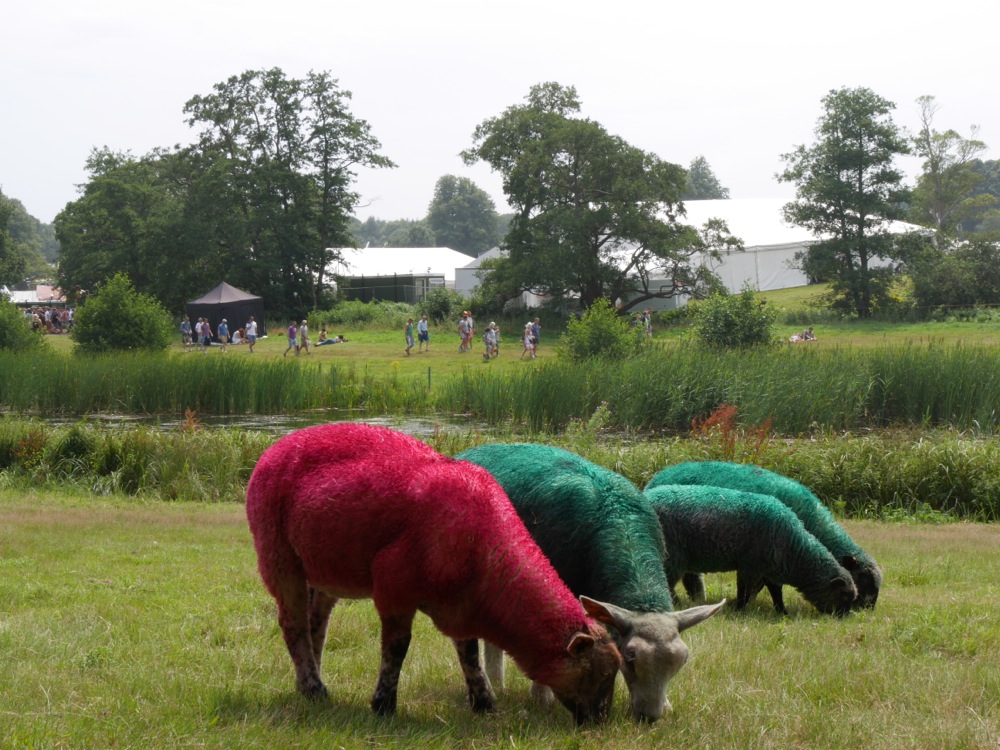 Kelis approached her gig very briskly with little in the way of the flattering preliminaries (she was about the only act not to proclaim her love for Latitude) but at first the crowd seemed generously to love her, regardless. She performed from her latest album, Food, a punchy, well-received R&B set with songs about her marriage and son. Her trademark whistle octave, a shrill, ecstatic top note way beyond her normal range, was used to much delight. It’s a raw, raucous effect without much finesse, but it serves her sensual material well. With only three others on stage, and little in the way of dancing beyond her rhythmically swaying hips, it was visually rather static. The funky brass instrumentation gave the music a delicious heritage R&B sheen, and the songs were well received, but her set needed a little more thought as a stage performance: interest was fading by the end, and the audience began to drift away.
Kelis approached her gig very briskly with little in the way of the flattering preliminaries (she was about the only act not to proclaim her love for Latitude) but at first the crowd seemed generously to love her, regardless. She performed from her latest album, Food, a punchy, well-received R&B set with songs about her marriage and son. Her trademark whistle octave, a shrill, ecstatic top note way beyond her normal range, was used to much delight. It’s a raw, raucous effect without much finesse, but it serves her sensual material well. With only three others on stage, and little in the way of dancing beyond her rhythmically swaying hips, it was visually rather static. The funky brass instrumentation gave the music a delicious heritage R&B sheen, and the songs were well received, but her set needed a little more thought as a stage performance: interest was fading by the end, and the audience began to drift away.
Rudimental, who were this year’s surprise band, having been a hit last year, made much better contact with the crowd, and their set was slickly choreographed, their touring force of nine swarming restlessly to and fro. They were chosen as the BBC’s festival band of the summer last year, and after a few minutes of their exuberant lyrics, rampant dance routine, and a rhythm section that’s like being machine-gunned with boulders, it’s easy to see why. It’s not subtle, and the songs are well-crafted rather than sophisticated; in many ways a Rudimental festival set is like half an hour with an over-stimulated puppy. But who doesn’t love that occasionally?
They could have turned up the bass a notch and drowned out the thunderstorm
Inevitably, they played “Feel the Love”, and the crowd yelped with glee. They sang “Free”, and even without Emeli Sandé, who features on the recording, the audience sympathised heartily with the line “I drink a little more than recommended”. When they sang “Solo”, with its lyric “You’re too cool to love me”, the crowd didn’t seem to agree. Though it would have been no reflection of the relative quality of their output, there’s an argument that Rudimental could have exchanged slots with Damon Albarn. In this kind of venue, there are few acts able to create such a party. And they could have turned up the bass a notch and drowned out the thunderstorm.
Only Atomic Bomb, performing a tribute (exclusive to Latitude, it’s claimed) to the elusive Nigerian funk legend William Onyeabor, matched Rudimental’s stage energy with a free-wheeling collaborative carnival onstage, performed by up to 20 musicians at once. Onyeabor released eight now extremely rare albums between 1978 and 1985, before becoming an evangelical Christian and refusing thereafter to discuss his music. The band, a constantly-shifting international collaboration, features such diverse talents as Alexis Taylor, Money Mark, Pat Mahoney, Scritti Politti and the Mahotella Queens. Their music, repeatedly changing character with the rotating performers, is a heady mix of funk, Nigerian folk, soul and jazz. Perfect for Sunday lunchtime, they were perhaps the most original piece of programming on the main stage, and a great opportunity to see familiar performers in a never-anticipated combination.
Alongside the chance to see global bands live, surely the greatest of festival pleasures is unearthing exciting new talent, and the rustic Latitude setting makes such exploration a pleasure. Between venues, there are dozens of charming shaded nooks; a massage tent here and a piano bar there, overlooking the multi-coloured sheep grazing the banks of the lake, a walking metaphor for the festival’s blend of the rustic and avant-garde.
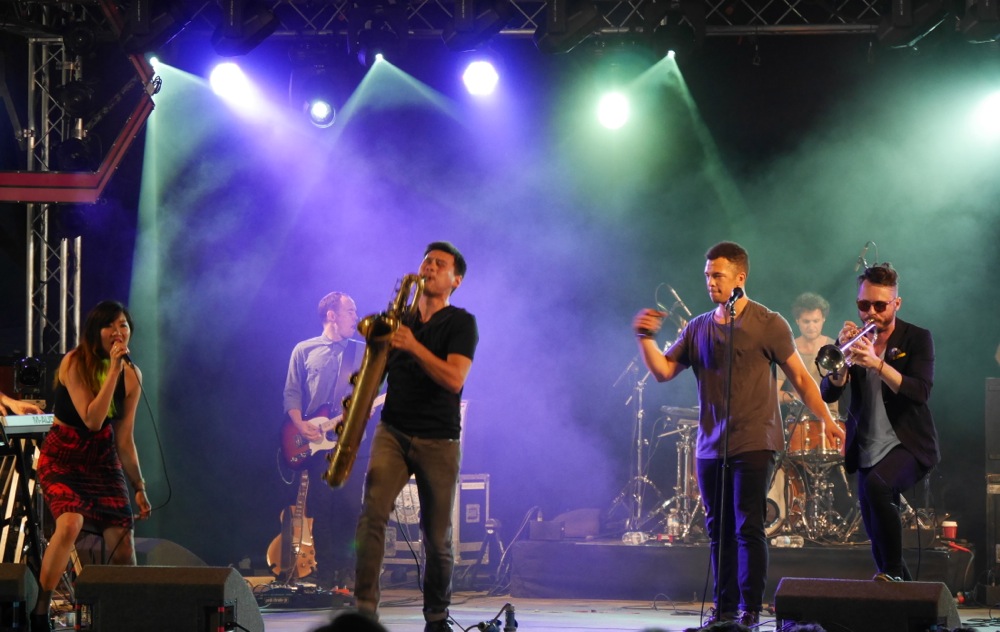 Brooklyn six-piece San Fermin (pictured left), on early in the BBC 6 Music Arena, have concocted a heady musical pot pourri of pop, funk and Latin. Trumpet and baritone sax mix a brass sheen and growl, electric violin decorates with folk riffs, while the accessible, emotionally direct songs choreographed with melodramatic dance-stomps, create a similarly vivid performance. Playing a mixture of original pieces and an unusual range of covers, their sound is both inclusive yet intriguing: they are capable of such stylishly executed variety, part of the fun is simply guessing where they will go next.
Brooklyn six-piece San Fermin (pictured left), on early in the BBC 6 Music Arena, have concocted a heady musical pot pourri of pop, funk and Latin. Trumpet and baritone sax mix a brass sheen and growl, electric violin decorates with folk riffs, while the accessible, emotionally direct songs choreographed with melodramatic dance-stomps, create a similarly vivid performance. Playing a mixture of original pieces and an unusual range of covers, their sound is both inclusive yet intriguing: they are capable of such stylishly executed variety, part of the fun is simply guessing where they will go next.
The Lake Stage, with its smallish white canopy leaving the artist in the shade and the audience in the sun, isn’t the easiest place to fire up some dancing. But 22-year-old London soul singer Moko (pictured below) did just that, her debutant’s eagerness and swinging mauve plaits motivating the sweatiest, post-prandially bloated raver into a scorched boogie. “Your Love”, Moko’s next single, summed up her appeal, with lyrical melody and whirring dance rhythm forming an irresistible cocktail.
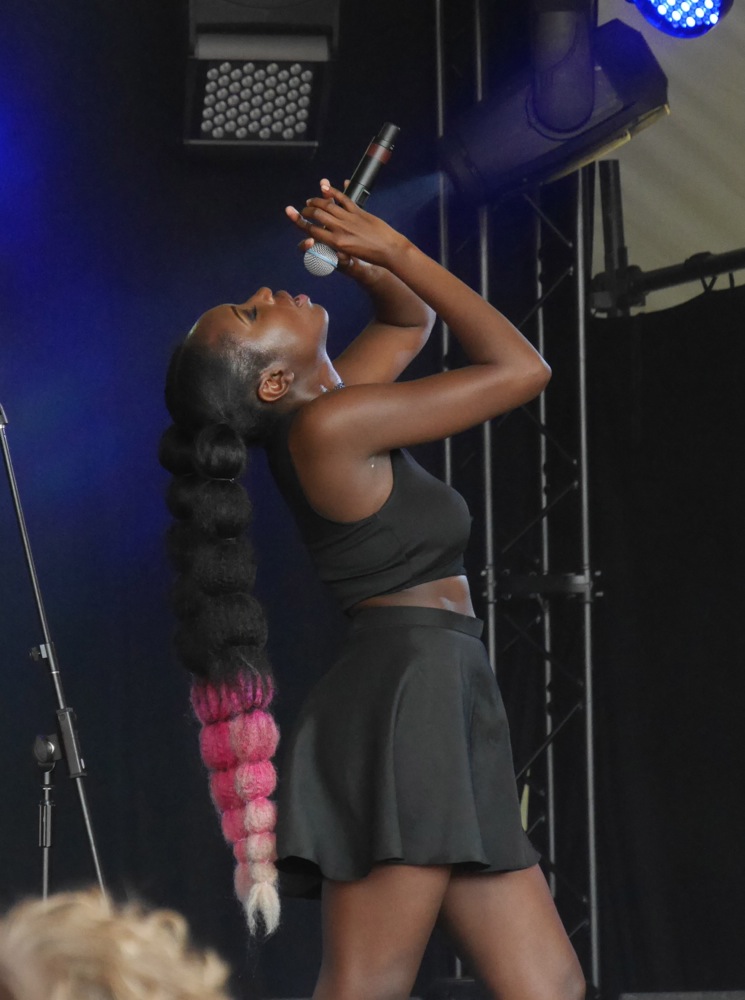 The innovative live improvising musician Beardyman performed his “album in an hour” concept before a live, standing audience for the first time on Saturday. With suggested titles submitted online in advance, and whittled down to an hour of music, Beardyman uses his state-of-the-art, custom-designed live mixing device the Beardytron to mix a track to suit the title live. It needs the right kind of titles to be properly innovative - and local variation will constantly change the character of the act - but when it works, as it did on Saturday, it’s a superb combination of comedy, improvisation and dance. Beardyman is already prominent on YouTube, and video is planned, but as live entertainment, it can be a really special experience.
The innovative live improvising musician Beardyman performed his “album in an hour” concept before a live, standing audience for the first time on Saturday. With suggested titles submitted online in advance, and whittled down to an hour of music, Beardyman uses his state-of-the-art, custom-designed live mixing device the Beardytron to mix a track to suit the title live. It needs the right kind of titles to be properly innovative - and local variation will constantly change the character of the act - but when it works, as it did on Saturday, it’s a superb combination of comedy, improvisation and dance. Beardyman is already prominent on YouTube, and video is planned, but as live entertainment, it can be a really special experience.
Unlike some big festivals (yes that’s you, Glastonbury), Latitude retains a commitment to jazz, both new and established. The Neil Cowley Trio, who performed on Sunday night, are firmly in the latter category, but the new British quartet Sons of Kemet, last year’s MOBO Jazz Act of the Year, have the potential to break through, and not just to the usual, mature crossover audience, but to a younger dance-music crowd. Performing late on Saturday at the BBC Radio 3 Late Junction stage, in a lovely woodland clearing just off the main path back to the campsite, they had the opportunity to catch the ear of exactly the kind of young fan who might be deterred by the ghettoising “jazz” tag. And despite a deluge by then approaching biblical proportions, a dedicated, dancing crowd gathered to hear their extravagant, looping brass-led improvisation. It bodes well for them.
German pianist and electronic music pioneer Hauschka (pictured below) bewitched the iArena, the loveliest venue of all, perched intimately in the woods above the lake, with his extraordinary blend of techno, improvisation and chamber piano. Using an acoustic piano into which all kinds of sound-distorting objects are introduced (this time it was a tambourine and other small percussion; in the past it’s been ping-pong balls, children’s toys and much more besides), and a mixing deck of with samples, he improvises on the piano, and with electronica, usually simultaneously. It sounds quite extraordinary, the piano resonating unpredictably, and the blend of electronic sound completing what was surely one of the most original acts at the festival.
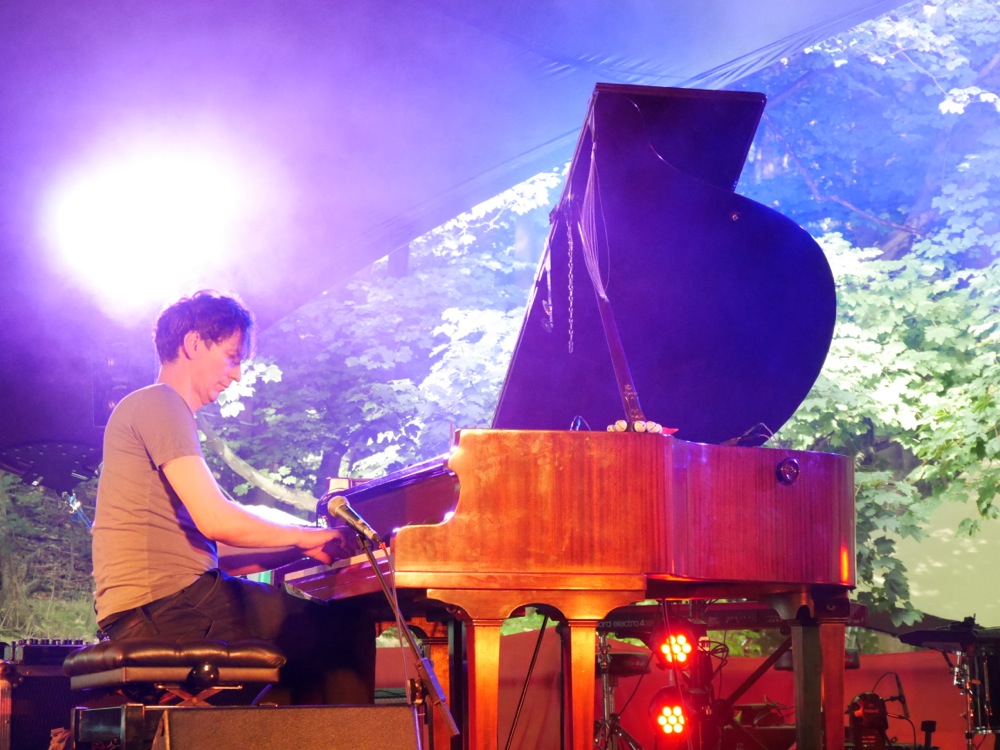 And so to the other events. The reassuring subtitle “More than just a music festival” hardly seems necessary these days, with so much else catering for all tastes and generations. My colleague Katie Columbus explored the theatre, dance and children’s events, so, after several hours of exhaustingly soul-ravishing music, I went in search of some jokes.
And so to the other events. The reassuring subtitle “More than just a music festival” hardly seems necessary these days, with so much else catering for all tastes and generations. My colleague Katie Columbus explored the theatre, dance and children’s events, so, after several hours of exhaustingly soul-ravishing music, I went in search of some jokes.
Often scheduled before the music begins, much of the comedy - and all of the events featuring familiar names - was immensely popular with headline performers bursting their (admittedly only medium-sized) venues to the seams in a way that most of the musicians struggled to do.
Yet, despite some enjoyable gigs, I began to wonder what the point was. What I say next comes as a committed fan of Radio 4 comedy, which I listen to as religiously as is possible to a station populated by radical atheists. There are good reasons comedy works on radio. It needs to be edited. Some of the jokes aren’t funny. Most comedians are not visually interesting (is Mark Steele the more enjoyable for an up-close view of his pasty legs?), there’s no set to look at, and nothing to dance to. You don’t pick up extra nuance or atmosphere from live comedy, as you do from any kind of live music performance. Unless you enjoy being picked on and unexpectedly humiliated, there’s no benefit in being there when the jokes are being tested. Why not just wait till the producer has weeded out the blank-firing ones?
Clearly I’m in a minority here, however. Saturday morning’s event with Jack Dee, in a “helpdesk” format with another Radio 4 stalwart Jeremy Hardy, was so popular it was necessary to queue for an hour beforehand, something never necessary for a musical performance. Not only that, but competition for a place became quite fierce: places in the queue were guarded jealously. This being the very centre point of Middle England, ferocity was expressed with a sharp rustle of the Telegraph gardening supplement. But the warnings were heeded. Do egalitarian quipsters like Jeremy Hardy see the irony in the sharp-elbowed, survival-of-the-fittest attitudes their shows provoked in the queuing audience?
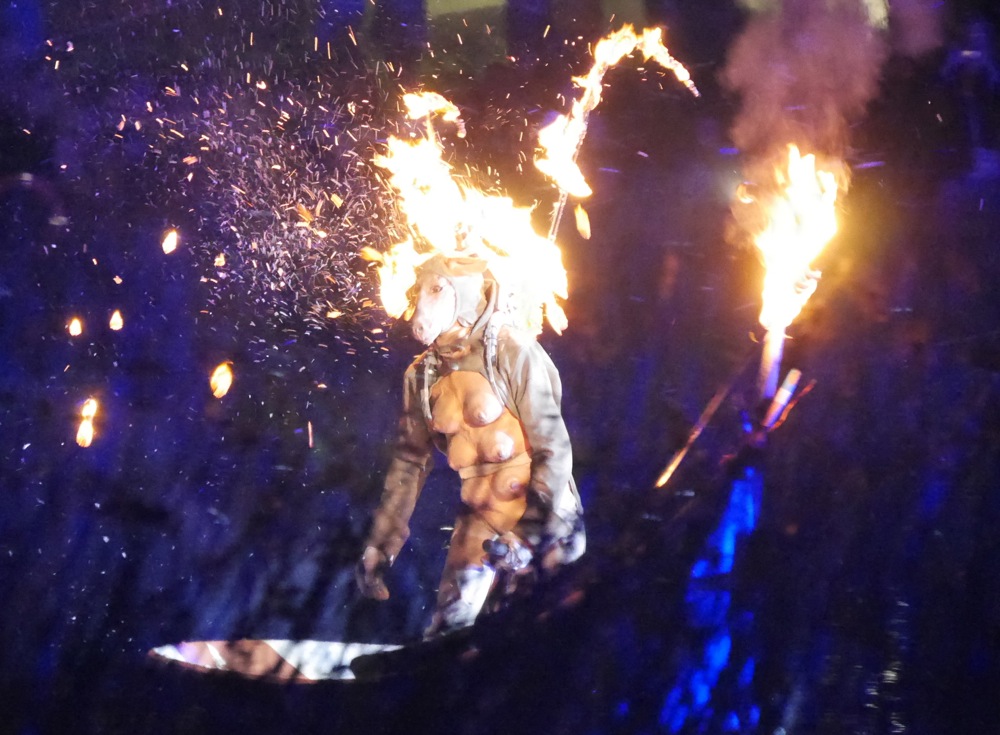 The many hundred staged events ran with impressive precision. Beyond the predictable “twitterstorm” of “protest” about Lily Allen’s booking as replacement following the cancellation of the sickly Two Door Cinema Club, audiences were a picture of contentment. The first generation of festival-goers is now getting on (in the press tent you’re as likely to meet a reporter from Saga Magazine as NME), but judging by the vigour with which grandpas grooved to Rudimental, they’ve no intention of hanging up their earplugs any time soon. Perhaps the only age group not well represented are the hardcore 20-something hedonists who dominate Glastonbury.
The many hundred staged events ran with impressive precision. Beyond the predictable “twitterstorm” of “protest” about Lily Allen’s booking as replacement following the cancellation of the sickly Two Door Cinema Club, audiences were a picture of contentment. The first generation of festival-goers is now getting on (in the press tent you’re as likely to meet a reporter from Saga Magazine as NME), but judging by the vigour with which grandpas grooved to Rudimental, they’ve no intention of hanging up their earplugs any time soon. Perhaps the only age group not well represented are the hardcore 20-something hedonists who dominate Glastonbury.
Only the initial transport arrangements, which left many visitors spending as long to get from one side of the venue to the entrance to their camping area as from home to the venue, were anything less than clockwork-smooth. The steward I spoke to blamed the chaos on the non-appearance of a bus-scheduling supremo called Andy, who was due to direct operations. So quickly did the mysterious Andy take on an epic significance in transport-related discussion, he began to resemble Beckett’s Godot, both for the excitement with which he was awaited, and the bewilderment his non-appearance thrust upon the queuing hordes. Only this time, the joke was on Andy - he didn’t know what he was missing.
The future of Arts Journalism
You can stop theartsdesk.com closing!
We urgently need financing to survive. Our fundraising drive has thus far raised £33,000 but we need to reach £100,000 or we will be forced to close. Please contribute here: https://gofund.me/c3f6033d
And if you can forward this information to anyone who might assist, we’d be grateful.

Subscribe to theartsdesk.com
Thank you for continuing to read our work on theartsdesk.com. For unlimited access to every article in its entirety, including our archive of more than 15,000 pieces, we're asking for £5 per month or £40 per year. We feel it's a very good deal, and hope you do too.
To take a subscription now simply click here.
And if you're looking for that extra gift for a friend or family member, why not treat them to a theartsdesk.com gift subscription?

Add comment